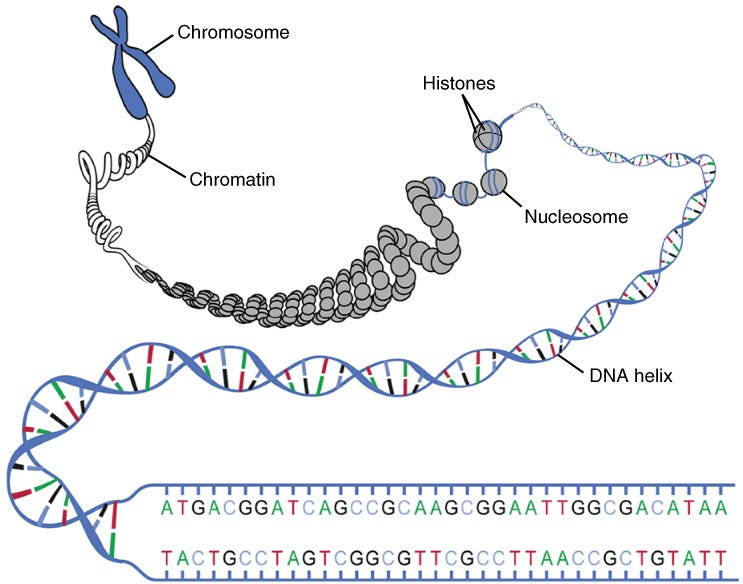DNA, RNA, proteins, etc.
The ribosome is itself an RNA. It is actually a “ribozyme”, an RNA with enzyme-like properties.
Antibiotics work because they inhibit the ribosomes of bacteria, without affecting human (eukaryotic) ribosomes. Exactly how, I do not know.
DNA is stored “folded” in the cell. Unraveled, the amount of DNA in a human cell would stretch out to 2 meters! Just one cell!
When a gene has to be read by the cell’s machinery, the area of the DNA around that gene “unfolds” to allow access to it. Anything that “stiffens” DNA will make it harder to read and for genes to be expressed. Conversely, anything that “loosens” DNA will make it easier to read.1
The tightness of how DNA is packaged is important in regulating which genes on the DNA are “tight” and “loose”, and thus which genes are expressed, and therefore which proteins are produced by the cell, and therefore the cell type.2 This means, I think, that cell type is, at least partially, determined by how the DNA is packaged in the cell — different packagings correspond to different cell types.
Y chromosomes do not undergo “recombination” in sexual reproduction. Except for degradation, every son receives his father’s Y chromosome as is with no input from his mother’s genetic code.
Typically, genes from the mother and father are “shuffled” or "crossed over" to produce a unique genetic code.
As a result, Y chromosome genes tend to degenerate as repetitive DNA sequences accumulate in the chromosome.
Homer and Ancient Oral Tradition
The Iliad and Odyssey were likely not written by someone named Homer, or any one person at all. The epic tales are likely the product of an oral tradition that heavily relies on improvised story telling.3
Parry’s research showed that, in an oral-performance tradition, it makes no sense to speak of a poem as having an authentic, original text. He found that, when he asked a guslar to perform the same poem on consecutive days, the transcripts could be dramatically different, with lines and whole episodes appearing or disappearing. With the guslar he considered the most gifted, a man in his sixties named Avdo Međedović, Parry tried an experiment: he had Međedović listen to a tale he’d never heard before, performed by a singer from another village, and then asked him to repeat it. After one hearing, Međedović not only could retell the whole thing but made it three times longer, and, in Lord’s recollection, much better: “The ornamentation and richness accumulated, and the human touches of character imparted a depth of feeling that had been missing.”
I actually learned about this sometime last year when I attempted to (start to) read the Iliad, but what is new is that you can hear recordings from the 1930’s and 1950’s of an existing tradition of oral poetry in Yugoslavia, which should not be that different from the Ancient Greek oral tradition; it even sounds to me like it follows the hexameter of the Iliad and Odyssey. The sound is wonderfully ancient, especially when there’s music, as if you are sitting by a fire listening to your local orator recite a classic, legendary story. Here’s an example: https://sds.lib.harvard.edu/sds/audio/461823374.



